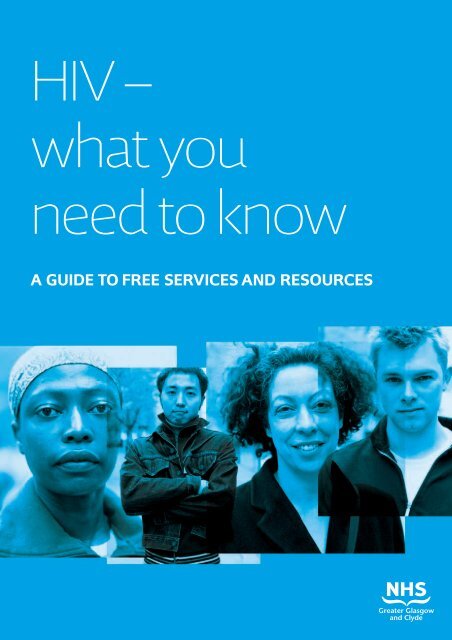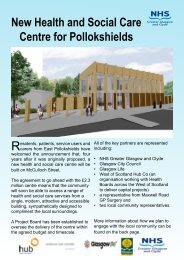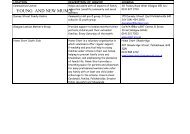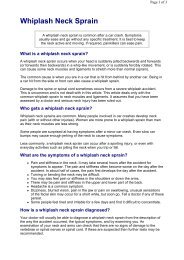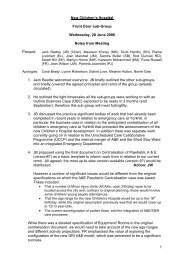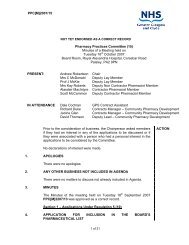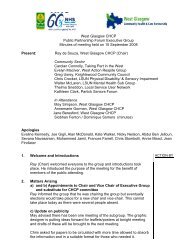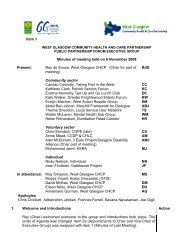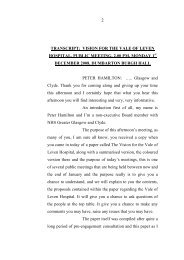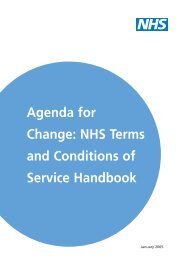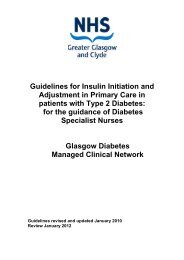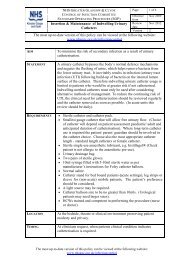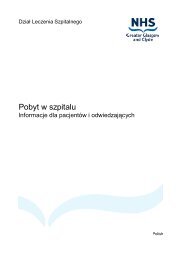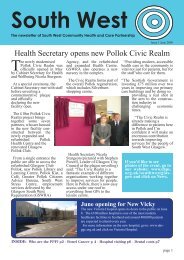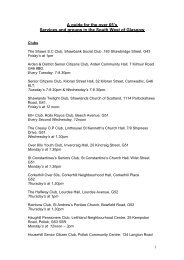HIV– what you need to know - NHS Greater Glasgow and Clyde
HIV– what you need to know - NHS Greater Glasgow and Clyde
HIV– what you need to know - NHS Greater Glasgow and Clyde
You also want an ePaper? Increase the reach of your titles
YUMPU automatically turns print PDFs into web optimized ePapers that Google loves.
HAI0316_<strong>NHS</strong> HIV leaflet:La<strong>you</strong>t 1 25/6/09 10:39 Page 1<br />
HIV –<br />
<strong>what</strong> <strong>you</strong><br />
<strong>need</strong> <strong>to</strong> <strong>know</strong><br />
A GUIDE TO FREE SERVICES AND RESOURCES
HAI0316_<strong>NHS</strong> HIV leaflet:La<strong>you</strong>t 1 25/6/09 10:39 Page 2
HAI0316_<strong>NHS</strong> HIV leaflet:La<strong>you</strong>t 1 25/6/09 10:39 Page 3<br />
You cannot tell by looking at<br />
someone if they have HIV.<br />
Having HIV does not mean that<br />
a person has done something<br />
wrong. HIV is a medical<br />
condition that is found in every<br />
country in the world. It can affect<br />
anyone, regardless of their age,<br />
gender, sexuality, relationship<br />
status, ethnicity or religion.<br />
3
HAI0316_<strong>NHS</strong> HIV leaflet:La<strong>you</strong>t 1 25/6/09 10:39 Page 4<br />
4
HAI0316_<strong>NHS</strong> HIV leaflet:La<strong>you</strong>t 1 25/6/09 10:39 Page 5<br />
HIV KEY FACTS<br />
– HIV is a treatable infection. There is no cure, but<br />
medicines are available which help people with<br />
HIV <strong>to</strong> keep well <strong>and</strong> live healthier lives.<br />
– Having an HIV test is the only way <strong>to</strong> <strong>know</strong> if <strong>you</strong><br />
have HIV or not. Many people do not have any<br />
symp<strong>to</strong>ms for many years <strong>and</strong> are not aware<br />
that they are living with HIV.<br />
– Someone who has HIV but does not get treatment,<br />
will over time, develop a number of serious illnesses<br />
<strong>and</strong> become very unwell. The sooner a person is<br />
tested for HIV the better.<br />
– Everyone in Scotl<strong>and</strong> including refugees <strong>and</strong> asylum<br />
seekers can access free HIV testing, treatment <strong>and</strong><br />
care via the National Health Service (<strong>NHS</strong>).<br />
5
HAI0316_<strong>NHS</strong> HIV leaflet:La<strong>you</strong>t 1 25/6/09 10:39 Page 6<br />
6<br />
HOW CAN A PERSON GET HIV?<br />
– HIV is an infection found in blood, breast milk,<br />
semen <strong>and</strong> vaginal fluid. You can only get HIV<br />
from someone who already has the virus,<br />
but only if the virus gets in<strong>to</strong> <strong>you</strong>r bloodstream.<br />
HIV CAN GET INTO YOUR BLOODSTREAM<br />
IN THE FOLLOWING WAYS:<br />
– Direct blood <strong>to</strong> blood contact.<br />
– Through having unprotected sex.<br />
– From an infected mother <strong>to</strong> her child,<br />
at delivery or from breastfeeding.<br />
YOU CANNOT GET HIV FROM:<br />
– Sharing food with someone who has HIV.<br />
– Sharing cooking or eating utensils with someone<br />
who has HIV.<br />
– Kissing someone with HIV.<br />
– Shaking h<strong>and</strong>s or hugging someone with HIV.<br />
– Using the same <strong>to</strong>ilet as someone who has HIV.
HAI0316_<strong>NHS</strong> HIV leaflet:La<strong>you</strong>t 1 25/6/09 10:39 Page 7<br />
A PERSON LIVING WITH HIV COULD HAVE:<br />
– Contracted HIV from having sexual intercourse<br />
without a condom.<br />
– Been infected with HIV from their mother during<br />
delivery or during breastfeeding. This is called<br />
Mother <strong>to</strong> Child transmission.<br />
– Been given infected blood (or blood products) during<br />
a blood transfusion. In the UK blood has been screened<br />
since 1984 <strong>and</strong> is therefore safe.<br />
– Been infected with HIV because a contaminated <strong>need</strong>le<br />
<strong>and</strong> syringe was used. This could be from sharing<br />
injecting equipment <strong>to</strong> take drugs, or in a hospital<br />
or clinic in a country that did not have good hygiene<br />
processes <strong>and</strong> where equipment was used on more<br />
than one person.<br />
7
HAI0316_<strong>NHS</strong> HIV leaflet:La<strong>you</strong>t 1 25/6/09 10:39 Page 8<br />
8
HAI0316_<strong>NHS</strong> HIV leaflet:La<strong>you</strong>t 1 25/6/09 10:39 Page 9<br />
WHO SHOULD HAVE AN HIV TEST?<br />
– If <strong>you</strong> have never tested for HIV <strong>you</strong> should consider a test.<br />
– If <strong>you</strong> have tested before, but in the last six months <strong>you</strong><br />
have had unprotected sex, shared injecting equipment or<br />
been in hospital in a country where equipment was not<br />
sterile or was used on more than one person, <strong>you</strong> should<br />
consider a test.<br />
– All pregnant women in Scotl<strong>and</strong> are offered an HIV test as<br />
part of their routine antenatal care. It is important for an<br />
expectant mother <strong>to</strong> have this test because if she has HIV<br />
there are a number of treatments that can be offered <strong>to</strong><br />
greatly reduce the risk of the baby becoming infected.<br />
Being HIV positive does not mean that <strong>you</strong> will not be<br />
able <strong>to</strong> have children. There are medical procedures that<br />
can enable HIV positive people <strong>to</strong> have a child safely, but it<br />
is important <strong>to</strong> <strong>know</strong> if <strong>you</strong> have HIV, so that <strong>you</strong> or <strong>you</strong>r<br />
partner <strong>and</strong> the baby are not put at risk of getting HIV.<br />
– Because HIV can be passed on through sexual intercourse,<br />
anyone thinking about having sex without a condom, even<br />
if they are in a relationship, including marriage <strong>and</strong> civil<br />
partnerships, should consider testing before doing so.<br />
9
HAI0316_<strong>NHS</strong> HIV leaflet:La<strong>you</strong>t 1 25/6/09 10:39 Page 10<br />
10
HAI0316_<strong>NHS</strong> HIV leaflet:La<strong>you</strong>t 1 25/6/09 10:39 Page 11<br />
WHAT DOES AN HIV TEST INVOLVE?<br />
– An HIV test involves a trained health professional taking<br />
a small amount of blood from <strong>you</strong>, usually from <strong>you</strong>r<br />
arm. If <strong>you</strong> get infected with HIV, <strong>you</strong>r body reacts <strong>to</strong> the<br />
infection <strong>and</strong> produces ‘antibodies’. The test looks <strong>to</strong> see<br />
if <strong>you</strong> have these HIV antibodies in <strong>you</strong>r blood. If <strong>you</strong> do<br />
have HIV antibodies this means <strong>you</strong> have HIV <strong>and</strong> this is<br />
usually called being HIV positive.<br />
– After <strong>you</strong> have been exposed <strong>to</strong> HIV it can take up <strong>to</strong><br />
12 weeks for <strong>you</strong>r body <strong>to</strong> develop HIV antibodies <strong>and</strong><br />
this is called the ‘window period’. This means that if <strong>you</strong><br />
were infected shortly before <strong>you</strong> have a test, it would<br />
not show up. In this case a repeat test will <strong>need</strong> <strong>to</strong><br />
be arranged.<br />
– Results can take up <strong>to</strong> 2 weeks depending on where<br />
<strong>you</strong> have <strong>you</strong>r test done.<br />
– HIV testing is confidential. A Health Professional will not<br />
tell anyone other than those involved in <strong>you</strong>r care that<br />
<strong>you</strong> have had a test. They will also not tell anyone the<br />
results of that test without <strong>you</strong>r permission or unless<br />
there were special circumstances. If a doc<strong>to</strong>r <strong>need</strong>ed <strong>to</strong><br />
tell someone else, they would discuss this with <strong>you</strong> first.<br />
11
HAI0316_<strong>NHS</strong> HIV leaflet:La<strong>you</strong>t 1 25/6/09 10:39 Page 12<br />
12<br />
WHERE CAN I GET A TEST?<br />
– There are a number of places where <strong>you</strong> can get<br />
an HIV test. More information is available about<br />
these services at the end of this leaflet.<br />
WHAT IF I AM HIV POSITIVE?<br />
– If <strong>you</strong>r test shows that <strong>you</strong> have HIV <strong>you</strong> will be referred<br />
<strong>to</strong> a specialist for further advice, support <strong>and</strong> treatment.<br />
All of this is free.<br />
– Having HIV may be a big shock but remember it is a<br />
medical condition <strong>and</strong> there are treatments that can<br />
help <strong>you</strong> stay healthy <strong>and</strong> well.<br />
– Being HIV positive does not mean that <strong>you</strong> can’t get<br />
married or have a sexual partner. However, if <strong>you</strong> do test<br />
positive it is important <strong>to</strong> discuss <strong>you</strong>r HIV status with<br />
future <strong>and</strong> current sexual partners. Talking <strong>to</strong> partners is<br />
important so that they can make decisions about whether<br />
they want <strong>to</strong> be tested. Talking about HIV with current or<br />
future partners also means that <strong>you</strong> can make informed<br />
decisions about reducing any risks, for example using<br />
condoms.
HAI0316_<strong>NHS</strong> HIV leaflet:La<strong>you</strong>t 1 25/6/09 10:39 Page 13<br />
– There have been some cases in the UK where people<br />
have been prosecuted for passing on HIV <strong>to</strong> sexual<br />
partners. This has generally happened when the person<br />
with HIV has not <strong>to</strong>ld the person they were having sex<br />
with that they had HIV <strong>and</strong> the virus has been passed on.<br />
Telling partners can be a difficult thing <strong>to</strong> do, but there are<br />
professionals, like sexual health advisers, who can offer<br />
advice <strong>and</strong> guidance on this. Using condoms with partners,<br />
even those who are also HIV positive is recommended,<br />
as it will help protect <strong>you</strong> against other STIs.<br />
– Having HIV will not affect <strong>you</strong>r immigration status or<br />
asylum claim. You will not be refused asylum because<br />
<strong>you</strong> are HIV positive, but having HIV does not guarantee<br />
refugee status or right <strong>to</strong> remain either.<br />
– Having HIV does not mean <strong>you</strong> will be unable <strong>to</strong> get life<br />
insurance or a mortgage; there are companies that will<br />
offer mortgages <strong>and</strong> life insurance <strong>to</strong> people who are<br />
HIV positive, but there might be less choice <strong>and</strong> it could<br />
be more expensive.<br />
– In the UK there are laws protecting people living with<br />
HIV from discrimination. If <strong>you</strong> think <strong>you</strong> have been<br />
discriminated against because of <strong>you</strong>r HIV status,<br />
<strong>you</strong> should seek advice from one of the HIV support<br />
organisations listed in this booklet.<br />
13
HAI0316_<strong>NHS</strong> HIV leaflet:La<strong>you</strong>t 1 25/6/09 10:39 Page 14<br />
14
HAI0316_<strong>NHS</strong> HIV leaflet:La<strong>you</strong>t 1 25/6/09 10:39 Page 15<br />
DO I NEED TO DO ANYTHING IF I AM HIV NEGATIVE?<br />
– If <strong>you</strong> test negative then <strong>you</strong> can take steps <strong>to</strong> make<br />
sure <strong>you</strong> stay that way. Having one negative test does<br />
not mean that <strong>you</strong> will always test negative. If <strong>you</strong> have<br />
been at risk any time after a negative test <strong>you</strong> should<br />
think about testing again.<br />
– An HIV test can only tell <strong>you</strong> about <strong>you</strong>r HIV status.<br />
It cannot tell <strong>you</strong> if <strong>you</strong>r current or previous partners<br />
are infected. Other people can only find out if they go<br />
for a test themselves.<br />
THINGS TO REMEMBER<br />
– The earlier a person is tested, the better. They can<br />
make important decisions about their health <strong>and</strong><br />
they will have a better chance of living a healthy life.<br />
– HIV is a medical condition that can affect anyone.<br />
– HIV testing is free.<br />
– There is free medication available <strong>to</strong> treat HIV.<br />
15
HAI0316_<strong>NHS</strong> HIV leaflet:La<strong>you</strong>t 1 25/6/09 10:39 Page 16<br />
16<br />
CONTACTS<br />
Counselling Clinic: 0141 211 1089<br />
Brownlee Centre, Gartnavel General Hospital<br />
1055 Great Western Road, <strong>Glasgow</strong> G12 0YN<br />
This service offers testing <strong>and</strong> treatment for Hepatitis <strong>and</strong><br />
HIV. You <strong>need</strong> <strong>to</strong> make an appointment before attending<br />
the service.<br />
SANDYFORD SERVICES<br />
At S<strong>and</strong>yford <strong>you</strong> can access HIV testing as well as support<br />
for a number of sexual, emotional <strong>and</strong> reproductive health<br />
issues. You can either make an appointment by phoning<br />
or visiting the service or there are times of the day when<br />
<strong>you</strong> can drop in (go without an appointment) <strong>and</strong> wait <strong>to</strong><br />
be seen. You must arrive before the end of the drop in<br />
session in order <strong>to</strong> be seen that day. Contact individual<br />
services <strong>to</strong> find out about opening times or go <strong>to</strong>:<br />
www.s<strong>and</strong>yford.org<br />
S<strong>and</strong>yford: 0141 211 8130<br />
2-6 S<strong>and</strong>yford Place, Sauchiehall Street, <strong>Glasgow</strong> G3 7NB<br />
S<strong>and</strong>yford East: 0141 232 7413<br />
Parkhead Health Centre, 101 Salamanca Street,<br />
<strong>Glasgow</strong> G31 5BA
HAI0316_<strong>NHS</strong> HIV leaflet:La<strong>you</strong>t 1 25/6/09 10:39 Page 17<br />
S<strong>and</strong>yford North: 0141 531 6703<br />
Springburn Health Centre, 200 Springburn Way,<br />
<strong>Glasgow</strong> G21 1TR<br />
S<strong>and</strong>yford South East: 0141 531 8349<br />
Govanhill Health Centre, Community Wing<br />
233 Calder Street, <strong>Glasgow</strong> G42 7DR<br />
S<strong>and</strong>yford South West: 0141 531 6807<br />
Pollok Health Centre, 21 Cowglen Road, <strong>Glasgow</strong> G53 3EQ<br />
S<strong>and</strong>yford East Renfrewshire: 0141 314 0885<br />
Barrhead Health Centre, 201 Main Street, Barrhead G78 1SA<br />
S<strong>and</strong>yford Renfrewshire: 0141 314 0726<br />
The Russell Institute, Causeyside Street, Paisley PA1 1UR<br />
S<strong>and</strong>yford Inverclyde: 01475 504 978<br />
Block 1 <strong>and</strong> 2, Residential Complex, Inverclyde Royal Hospital,<br />
Larkfield Road, Greenock PA16 0XN<br />
S<strong>and</strong>yford West Dunbar<strong>to</strong>nshire: 01389 818 511<br />
Ground Floor, Old Maternity Block, Vale of Leven Hospital,<br />
North Main Street, Alex<strong>and</strong>ria G83 0VA<br />
C-card Service: 0141 211 8130<br />
The C-Card service provides a range of free condoms from<br />
a variety of locations across the health board area.<br />
www.<strong>you</strong>rccard.org.uk<br />
17
HAI0316_<strong>NHS</strong> HIV leaflet:La<strong>you</strong>t 1 25/6/09 10:39 Page 18<br />
18
HAI0316_<strong>NHS</strong> HIV leaflet:La<strong>you</strong>t 1 25/6/09 10:39 Page 19<br />
HIV SUPPORT SERVICES<br />
African Support Project: 07956 620 461or 07944 840 666<br />
This service is for Africans living with HIV within <strong>Greater</strong><br />
<strong>Glasgow</strong> <strong>and</strong> <strong>Clyde</strong>. Provides peer <strong>and</strong> emotional support,<br />
information, advocacy <strong>and</strong> volunteering opportunities.<br />
HIV Peer Support Project: 0141 211 1692<br />
Support Service for all people living with HIV within<br />
<strong>Greater</strong> <strong>Glasgow</strong> <strong>and</strong> <strong>Clyde</strong>.<br />
Gay Men’s Health: 0141 552 0112<br />
Fifth Floor, 48 Albion Street, <strong>Glasgow</strong> G1 1LH<br />
Service for gay men including support groups <strong>and</strong><br />
counselling for those living with HIV.<br />
www.gmh.org.uk<br />
Terrence Higgins Trust (Scotl<strong>and</strong>): 0141 332 3838<br />
134 Douglas Street, <strong>Glasgow</strong> G2 4HF<br />
Confidential helpline: 0845 12 21 200<br />
Services for people living with HIV include welfare<br />
rights <strong>and</strong> benefits advice, one <strong>to</strong> one practical <strong>and</strong><br />
emotional support <strong>and</strong> group work.<br />
www.tht.org.uk<br />
19
HAI0316_<strong>NHS</strong> HIV leaflet:La<strong>you</strong>t 1 25/6/09 10:39 Page 20<br />
Public Education Resource Library: 0141 201 4915<br />
www.nhsggc.org.uk<br />
Version 1: June 2009, review date: 2011


